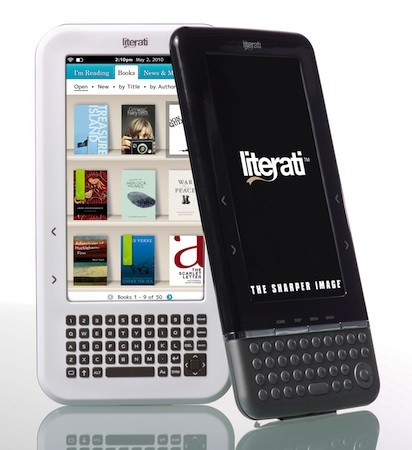New Color E-Readers Announced - Do They Stand a Chance?
- by Thomas C. McKinney

Sharper Image's Literati.
The second August color E-Reader announcement came only a few days ago when I read in the New York Times that Sharper Image had partnered with a company called MerchSource to release a color-screen E-Reader for under $200. This new E-Reader is called the Literati by Sharper Image, and beginning in October, it'll be available for $159. Now, I know what you're probably asking yourself: "Sharper Image still exists?!" Well, in the form they were known for in the 1990's, which was gadget retail stores and mail-order, no, they don't exist like that anymore. Instead, since 2008 when they closed their shops, they simply license their name to others.
I'm more optimistic about the future of the Literati as a reader than I am the Primer. One thing the Literati has that the Primer lacks is a clear source for material. It's powered by Kobo's E-Book engine (Borders' partner), and also features Wi-Fi only connectivity (no cellular plan as is included with Amazon's Kindle). So if you have a wireless network available, books can be downloaded through Borders' online e-book store, which offers over two million titles. That's a big plus over the Primer, and well worth the $60 in my opinion. In addition, the E-Reader comes with 25 public domain titles pre-installed, with a coupon code to allow the downloading of another 125 public domain titles. What the Literati lacks is clear information about its specs as it has only been announced and not released yet. The Literati Site itself is relatively barren. While it includes a color screen and wi-fi capability for downloading e-books, there's no indication that you can watch movies or listen to music on the device, and there's no web browser for actual web surfing. One might argue that a color screen is no longer necessary on a device that can't access the Internet or play multimedia formats. In the end, the Literati may appeal to e-book readers looking for a color screen, and not much else.
The e-book reader market is still very much a form taking shape. The technology is improving, and getting cheaper, and the entire industry is under pressure to drop its prices, or add features. Price points are volatile, as we saw Barnes & Noble and Amazon.com literally lower their prices by $50 and $60 overnight. For the majority of consumers, all-purpose devices that mimic a computer's functions will enjoy more success than dedicated E-Readers. We're already seeing this as Apple's iPad has enjoyed tremendous success among consumers, selling hundreds of thousands in the first days of its release. The advantage that the iPad and tablets based on Google's Android operating system have is that they allow for third-party software to be downloaded and installed. So on an iPad, you have access to Apple's iBookStore, Amazon's Kindle Store, Barnes & Noble's Store and Border's Kobo Store. Where exclusivity-deals could potentially affect the available selections on dedicated readers, tablet-computers will have the complete selection as long as e-book sources continue putting out their corresponding applications to be freely-downloadable. The entire selection of e-books plus multiple features is a hard-to-beat comparison when looking at tablets and dedicated readers.